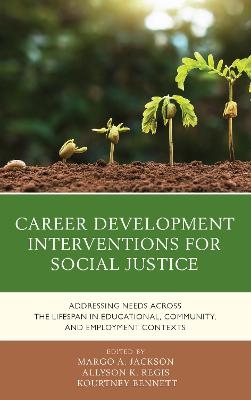
Career Development Interventions for Social Justice
Rowman & Littlefield (Verlag)
978-1-5381-2488-8 (ISBN)
Career development interventions can serve as one means to constructively address the problems of inequitable access to educational and occupational options and achievement that promote health and well-being across the lifespan. Career Development Interventions for Social Justice: Addressing Needs across the Lifespan in Educational, Community, and Employment Contexts offers practical examples of career development interventions that may be adapted to constructively address social justice needs at various points across the lifespan (ranging from elementary school ages to older adults) in educational, community, and employment contexts.
Tailored to the needs and context of a specific underserved group of individuals, each intervention integrates relevant career development theory, research, ethical considerations, elements of sound program design and evaluation, and professional competencies for best practices in multicultural career counseling and social justice advocacy. Unique to this book are the contributions of authors, including practicing professional counselors and psychologists, who share their personal reflections of self-awareness from privileged and marginalized identities regarding potential biases and resources of relevance to their chapter’s intervention. In the process of designing and providing career development services for individuals from marginalized groups, it is imperative for counselors to continually reflect on and consult about their own biases and resources for empathic understanding and effectiveness with those whom we serve.
Margo A. Jackson, PhD, is a professor of counseling psychology in the Graduate School of Education at Fordham University, Lincoln Center. Her scholarship and mentoring are grounded in values of social justice awareness and advocacy; multicultural and interdisciplinary perspectives; and scientist-practitioner approaches to training and practice that are holistic, strength-based, developmental, and focused on facilitating healthy human relationships. Her research, teaching, and service focus on methods to assess and constructively address hidden biases and strengths of counselors, psychologists, educators, and other leaders; career development across the life span; and ethical training and supervision in multicultural counseling and psychology. Allyson K. Regis, PhD is a licensed psychologist who received her doctorate in counseling psychology from Fordham University. Dr. Regis has worked in a variety of clinical settings and particularly enjoys working with college students who have difficulty adjusting to/navigating the college environment. Her research, teaching, and leadership experiences have focused on multicultural considerations in clinical work, strength-based approaches to wellness, and career development theory. Kourtney Bennett, Ph.D., is a staff psychologist at the Loyola University Maryland Counseling Center. She completed her doctoral studies at Fordham University’s APA accredited Counseling Psychology Program. Her clinical experiences include supporting youth and adults at community mental health, college counseling, and career development center settings. Her research and service interests include multicultural and intersectional identity, vocational development among adolescents and emerging adults, and social justice and advocacy.
Part I: Career Development Interventions for Social Justice Needs in Educational Contexts A: With Under-Served Children (Elementary School Ages)
Chapter 1: Anti-bias Career Development for Evolving Identities in Elementary School Children, Victoria Broems and Margo A. Jackson
B: With Under-Served Young Adolescents (Middle School Ages)
Chapter 2: Identifying Strength-based Transferable Skills from Personal Accomplishment Narratives to Expand Educational/Career Pathways with Marginalized Youth, Margo A. Jackson, Gary L. Dillon Jr., Kourtney Bennett, and Allyson K. Regis
C: With Under-Served Adolescents (High School Ages)
Chapter 3: Crossing Sociopolitical Barriers: Promoting Critical Consciousness and Career Development among High School Students, Kourtney Bennett
Chapter 4: A Program to Promote Career Development and Counseling Services in High Schools with LGBT Students, Jill Huang
Chapter 5: Step-Up Career Development Program with Unaccompanied Latinx Refugee Youth in Resettlement High Schools, Elizabeth A. Quiñones
D: With-Underserved College Students
Chapter 6: Gen1 Quick-Start: Academic Major and Career Decision-making Workshop for Latina First-Generation Freshmen, Ariel T. Sorensen
E: In Diversity Training with Colleges and Universities
Chapter 7: Coming to Understand and More Constructively Respond to Racial Microaggressions, Margo A. Jackson
Part II: Career Development Interventions for Social Justice Needs in Community and Employment Contexts
A: With Under-Served Adolescents
Chapter 8: Girls in Action: Career Development with Juvenile Justice Involved Adolescent Girls, Lauren A. Sonnabend
B: With Under-Served Adults
Chapter 9: Addressing Employment Uncertainty of Rural Working Adults: A Telemental Health Community Workshop, Shannon M. O’Neill
Chapter 10: Life Design Group Course for Laid-Off Workers, Kathleen Hahn
Chapter 11: Empowering Battered Women with BRAVER: Breaking the Reins of Abuse and Violence through Employment Reeducation, Adia Tucker
Chapter 12: Career Progression Workshop for the Internationally Educated, Fanny Kuang
Chapter 13: Gradually Reintegrating Ex-Offenders into the Workforce, Allyson K. Regis and Gary L. Dillon Jr.
Chapter 14: Developing Managers’ Skills for Countering Racial Color Blindness and Constructively Addressing Racial Microaggressions in the Workplace, Christine S. Romano
C: With Under-Served Older Adults
Chapter 15: Booming Through Retirement: Optimizing Psychosocial Resources for Retirement Success in Baby Boomers, Ashley E. Selkirk
Appendices
Appendix A: Career Counseling Competencies (National Career Development Association, 1997, 2009)
Appendix B: Advocacy Competencies (Lewis, Arnold, House, & Toporek, 2003)
| Erscheinungsdatum | 23.03.2019 |
|---|---|
| Verlagsort | Lanham, MD |
| Sprache | englisch |
| Maße | 160 x 231 mm |
| Gewicht | 640 g |
| Themenwelt | Geisteswissenschaften ► Psychologie |
| Medizin / Pharmazie ► Medizinische Fachgebiete ► Psychiatrie / Psychotherapie | |
| Sozialwissenschaften ► Soziologie ► Empirische Sozialforschung | |
| ISBN-10 | 1-5381-2488-2 / 1538124882 |
| ISBN-13 | 978-1-5381-2488-8 / 9781538124888 |
| Zustand | Neuware |
| Informationen gemäß Produktsicherheitsverordnung (GPSR) | |
| Haben Sie eine Frage zum Produkt? |
aus dem Bereich


